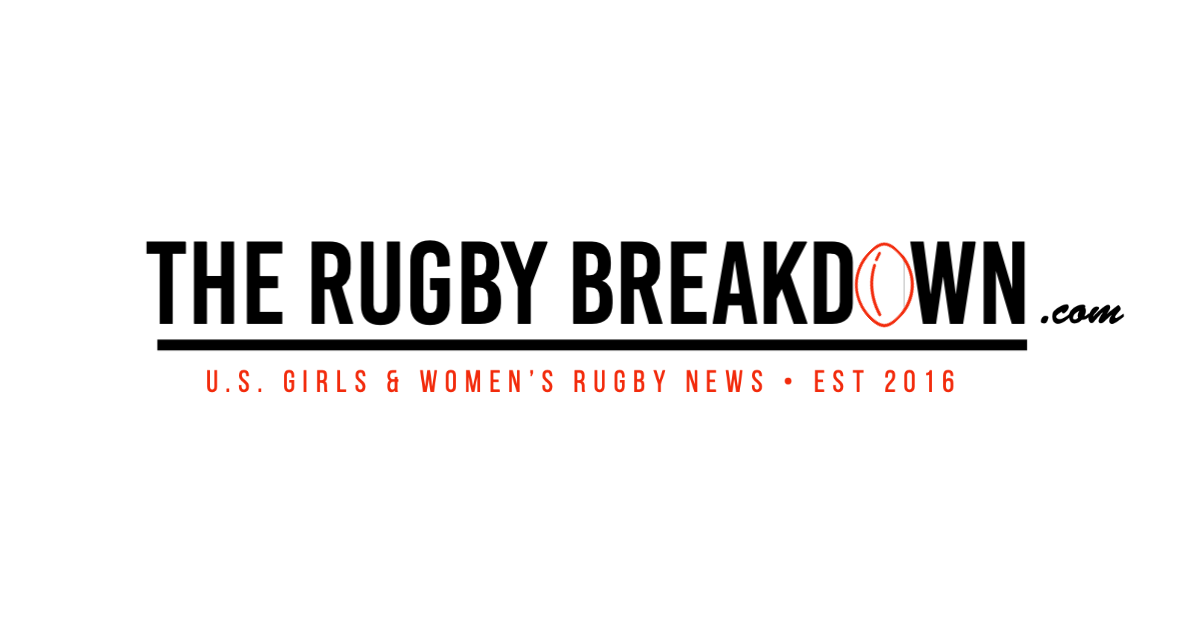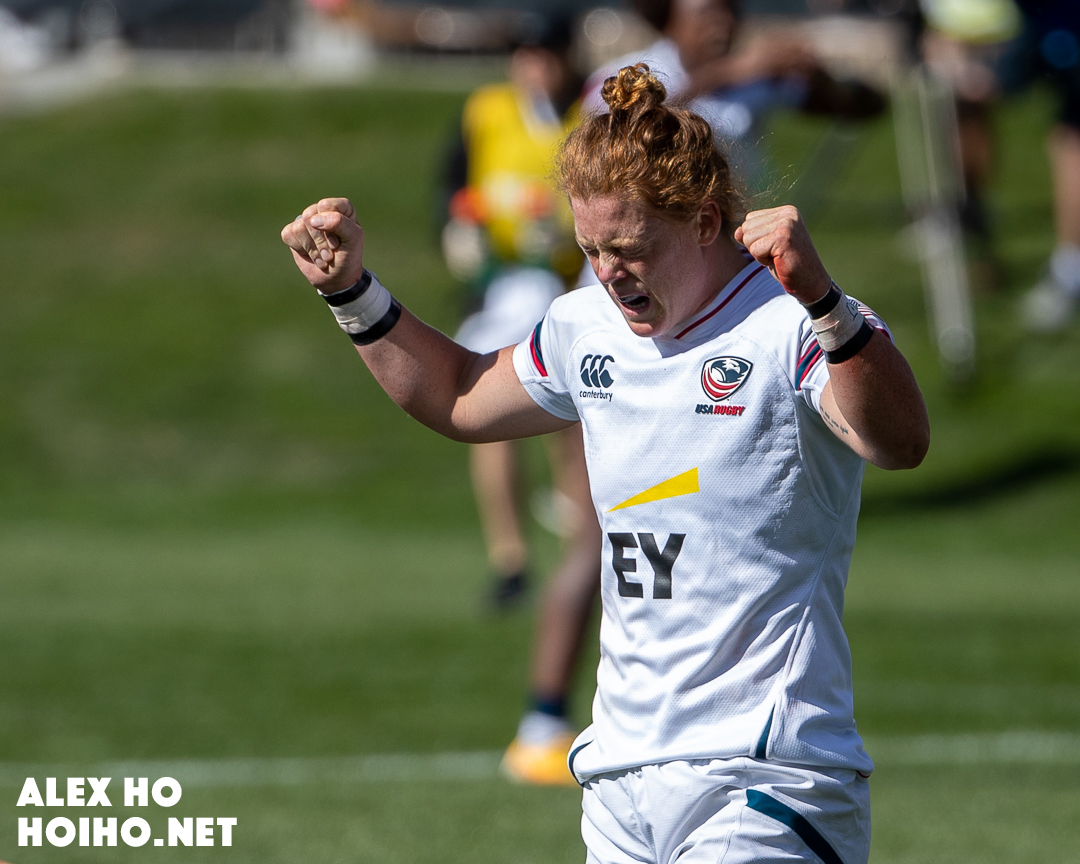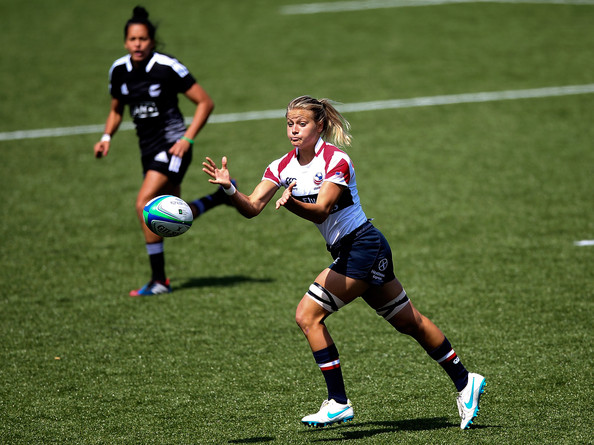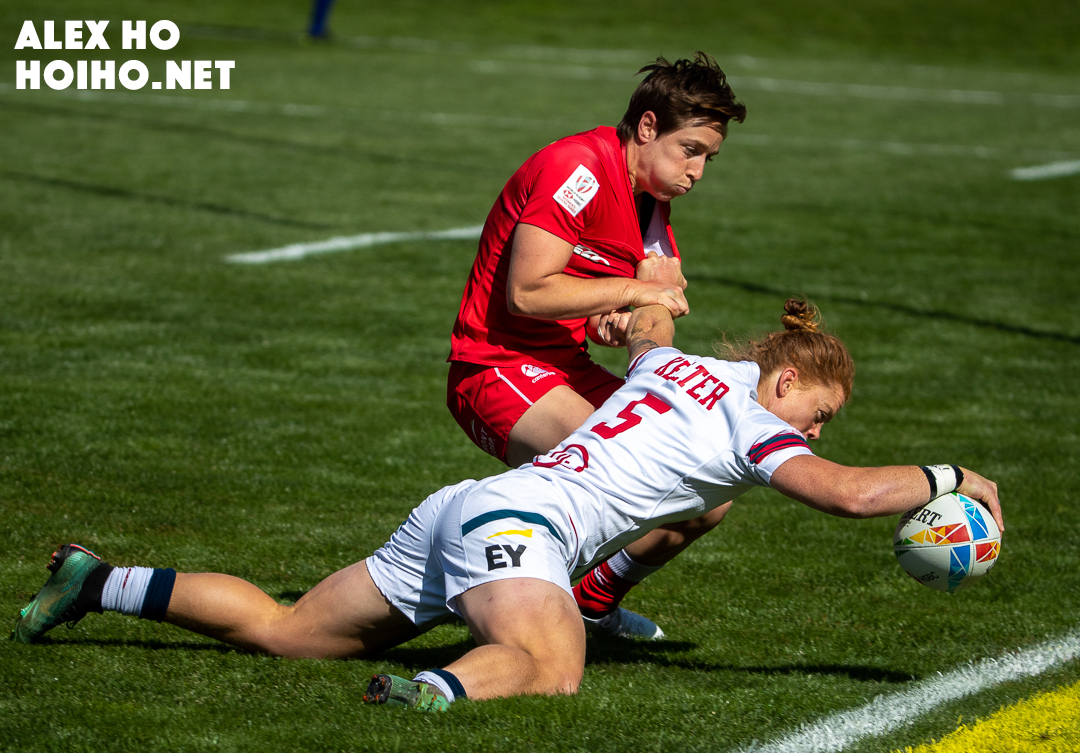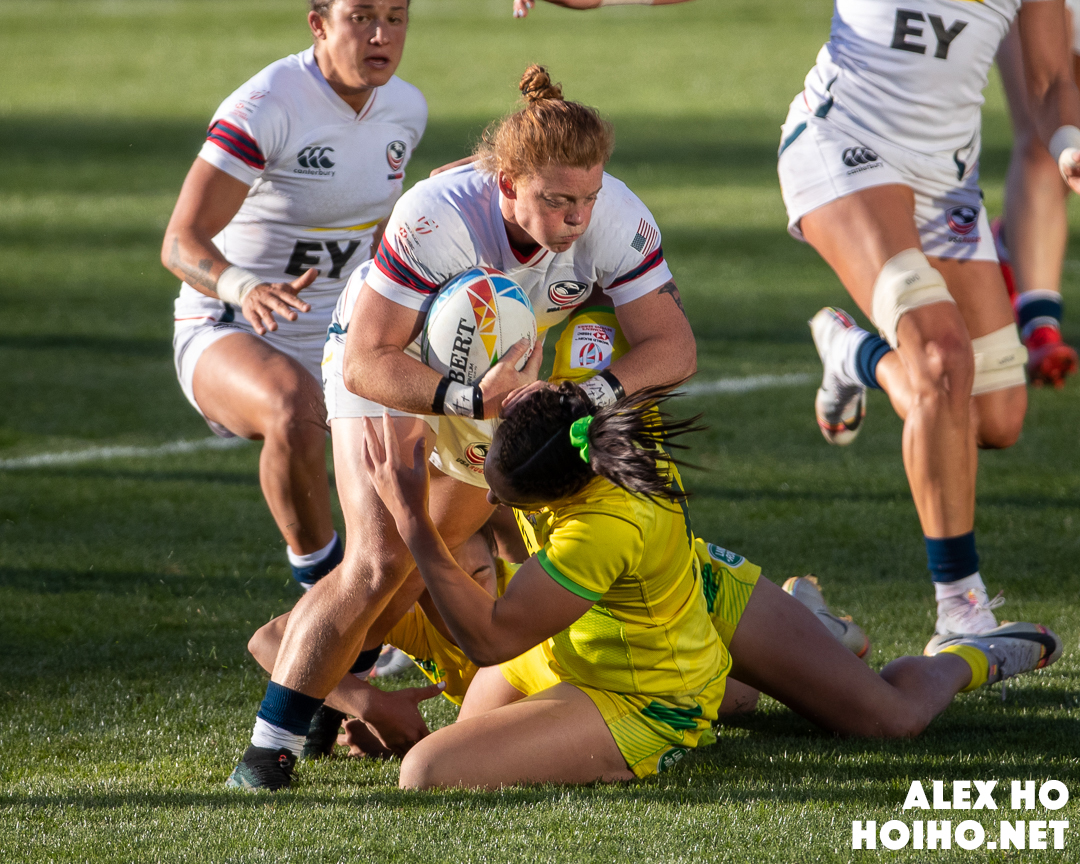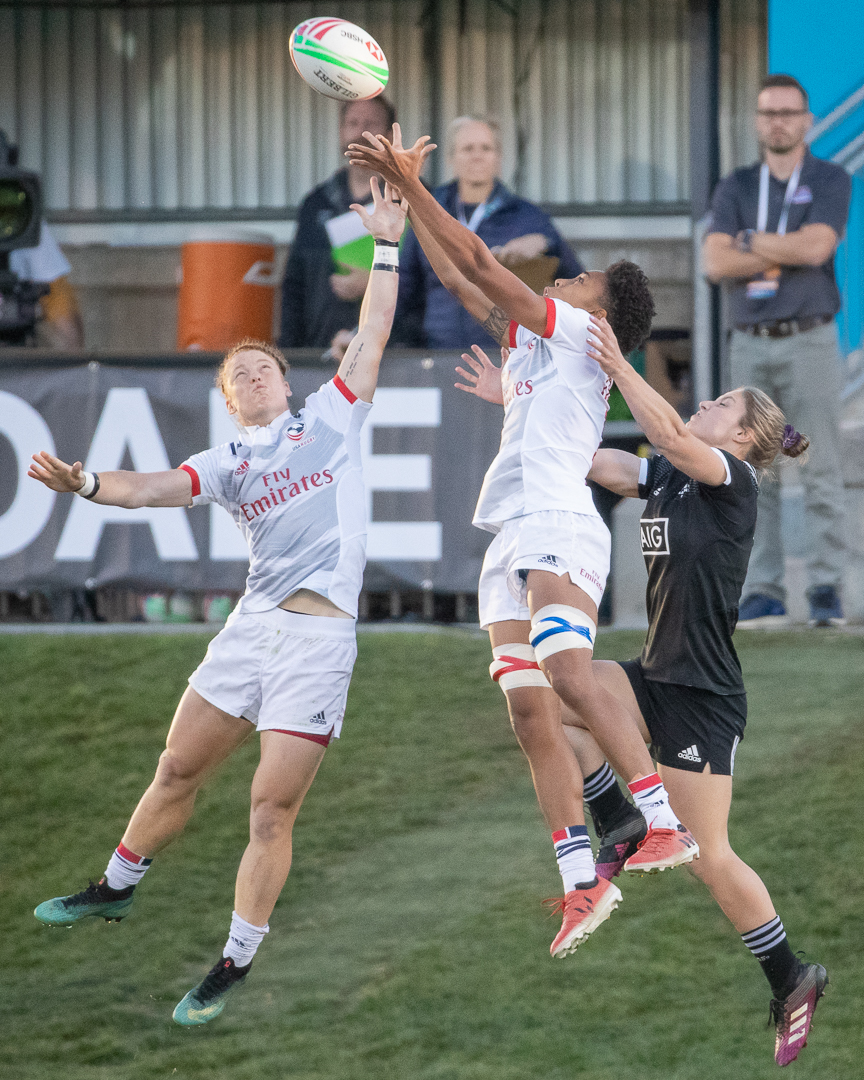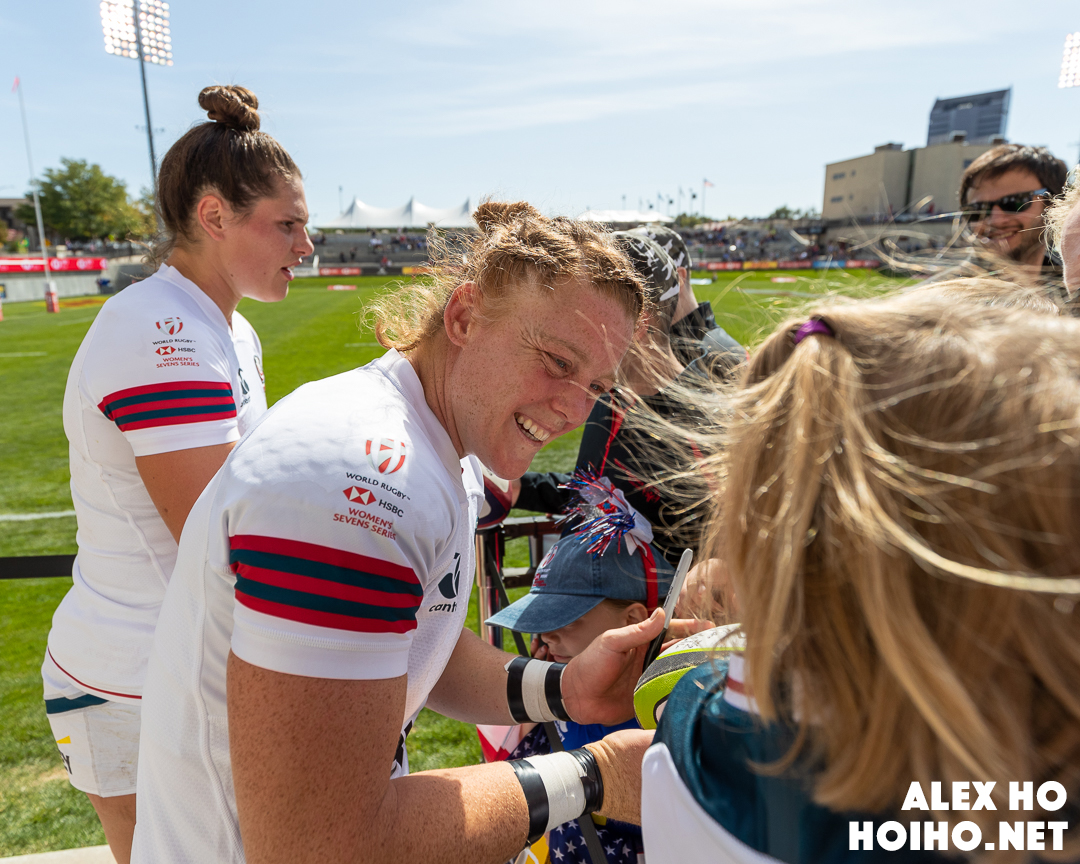The following was written more than a year ago, as the USA Women 7s team was readying for the first stop on the 2019-20 HSBC World Rugby Sevens Series. The piece was originally produced for a start-up print magazine that never came to fruition, so it lives here, nearly one year after the Eagles won the gold medal in Glendale, Colo.
In the U.S., rugby origin stories commonly begin with the freshmen activity fair and engaging collegians recruiting passers-by. Or they trace back to that relentless dormmate, who invited the entire floor to training, insisting that everyone is one tackle away from falling in love with rugby. These elements of chance and intrigue are found in Alev Kelter’s path to rugby, but it evolved at a completely different level and with incredible success. But as the rest of the rugby world soon discovered, everything about this 7s and 15s Eagle is next-level.
When the late Ric Suggitt joined the USA Women’s 7s team in 2010, the head coach considered the potential player pool beyond the all-star and club 7s national championships. Among other competitions, the Canadian eyed the NCAA, which in Division 1 alone cleared more than 85,000 student-athletes for women’s sports last year. That’s where he found Alaskan Lorrie Clifford, the basketball player from DII Western Oregon, who then recommended a hometown friend for consideration.
“I’m kind of forever thankful,” Kelter said of Clifford’s tip. “She’s part of my story.”
Suggitt made the call in December 2013, as fifth-year-senior Kelter was considering life after the University of Wisconsin. The Division I soccer and hockey player was in the USA system for both sports and looking at professional opportunities at home, Canada and abroad. “Give it a try,” was Suggitt’s sell, and Kelter bit.
“He inspired us to be the best athletes we can be but he also inspired us to be the best humans we can be,” Kelter said of Suggitt’s legacy.
“He always talked about feeding the good wolf versus the bad wolf,” Kelter continued. “It’s an analogy to make sure you’re always doing good and bettering yourself and having a growth mindset.”
Kelter consumed the game, spending those first two years in Chula Vista, Calif., really learning the sport and refining on the international 7s series. As Kelter’s rugby sensibilities developed, so did a new confidence, one that allowed the gifted athlete to play instinctually and become the difference-maker she is today. Kelter is the one you want in the middle of the pitch, who has an eye and influence on everything but can individually turn a game – with a deke, poach, try-saving tackle or a 50-meter, show-stopping dance to evade pursuers en route to the try line.
Kelter helped Team USA to a fifth-place finish at the 2016 Olympics Games and is one of three current residents with Summer Games experience (Lauren Doyle and Joanne Fa’avesi are the other two, and Nicole Heavirland traveled as a reserve). Last year, the USA finished second of the World Rugby Women’s Series and won the final tournament in Paris.
“It definitely gave us momentum into next year saying, ‘OK, that was the last stop. It was the best stop. Let’s make sure we have something to reference,’” Kelter said of Paris. “We always said in our minds that we would never be able to make an Olympic gold medal run if we had never won a tournament. I don’t know if that’s real or not, but there is definitely some mental aspects of it: You taste it, you want it, you know it, you can do it again.”
The USA confirmed that it can do it again. In early October, the 2019-20 world series kicked off in Glendale, Colo. After going 2-1 in pool play, the Eagles beat Canada, New Zealand and Australia for the gold medal.
“It’s a culmination of every year,” Kelter said of present-day success. “So each year, it was never a stagnant or complacent year. We always kept incrementally getting better. And so I think that as you continue to do that each year, there’s going to be a year that you reach the top. And then from there is what defines your character. Are you going to continue to consistently be at the top? Can you fluctuate? So that’s going to be our goal, to stay at the top and enjoy being at the top.”
The 2020 Olympics is the focal point, and that’s the context in which Kelter and Team USA will be viewed for the next year. But Kelter’s story is so much more compelling when 15s is introduced. The USA has had its successes in converting superior athletes to 7s, but those triumphs aren’t replicated in 15s, and especially when the individual’s introduction to the long-form version of the sport is at the international level.
During the 2017 Rugby World Cup cycle, then-head coach Pete Steinberg inquired about Kelter’s interest in trying 15s.
“At that point I really just needed to play rugby, and any rugby was something that would be helpful for me,” said Kelter, whose first exposure to 15s occurred during USA training camps. “It was definitely an equal effort to say, ‘Hey I’m putting my hand up, but I’m not sure what I’m putting my hand up for, but if you guys want to teach me I’m in.’”
Kelter subbed on during the USA’s opening match against Italy and then worked into the starting lineup going forward. No one would have known that Kelter had virtually no experience with 15s. The center read the flow of play well, hit great lines, and played with trademark aggression.
“I was nervous and excited at the same time, and then I think the adrenaline overtook, natural abilities to just kind of problem solve,” Kelter said. “With the coaching staff and with my teammates, they helped me tremendously. I would definitely attribute staying successful to our camaraderie and our chemistry; their willingness to teach and my willingness to be an open sponge and coachable.”
That mindset is something that all crossover athletes who enter rugby at the international level have to embrace, and it was the second time that Kelter worked through that process with rugby. With an Olympics and Rugby World Cup on the resume – and potentially return visits in 2020 and 2021, respectively – perhaps it’s time to stop considering Kelter a crossover, and just stick with “rugby player.”
“You play the sport that you play and that’s what your term is,” Kelter said. “I’m a rugby player because I’m playing rugby. But I don’t take it as an offense to be [called] a crossover athlete. It’s a huge part as to why I’m successful at rugby because I came from a dynamic hockey and very skilled soccer side with Wisconsin. It’s nice to be called a rugby player but it’s not an end-all be-all.”
Kelter was unmoved by terminology in a way that suggested there were more important issues to consider. Kelter is in the middle of prepping Team USA for a solid world series run and Olympics, and then hopes to turn around and make the 2021 Rugby World Cup squad for the New Zealand tournament.
“Just enjoy the process,” Kelter said. “With any business or corporation, you set your goals high, you reach those, you set new goals. That’s what we’re doing. We’re not distracted by it. We’re not worried about it. We’re just trying to stay as present as possible through this whole thing, not look to the future to the Olympics but to each day and living out those values.”

